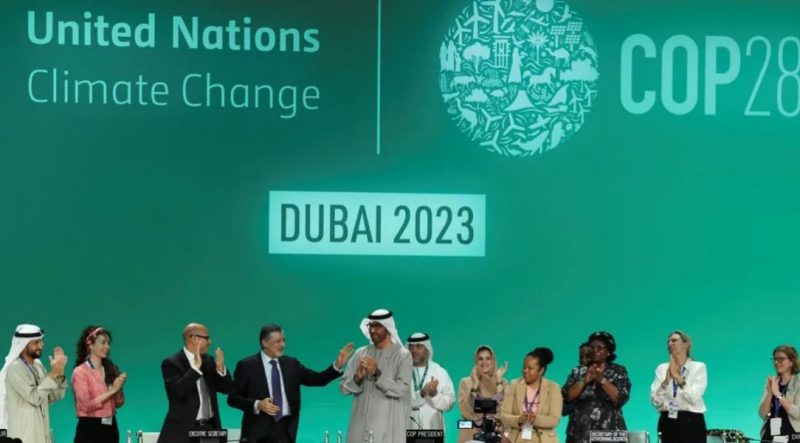Emission Reduction And Global Shift From Fossil Fuels: COP28 Agreement Signals A Climate Revolution

Categories :
The COP28 secures an agreement aimed at reducing global fossil fuel consumption. A "historic" event according to the Summit President Sultan al-Jaber, the event raises concerns by small island states, asserting that the deal falls short of meeting the urgent demands posed by their vulnerable positions. OPEC, on the other hand, advocates for a focus on emissions rather than fuels during the negotiations.
In a significant step towards transitioning away from the oil age, representatives from nearly 200 countries committed to the reduction of global fossil fuel consumption. The deal, achieved after two weeks of intense negotiations, aims to convey a powerful message to investors and policymakers about the global unity in breaking ties with fossil fuels—an imperative measure to avert the impending climate catastrophe.
COP28 President Sultan al-Jaber hailed the agreement as "historic," emphasising the critical importance of translating the accord into tangible actions for true success. He declared:
"We are what we do, not what we say."
The agreement faced significant contention, with over 100 countries advocating for strong language to "phase out" oil, gas, and coal. This stance encountered staunch opposition from OPEC, led by Saudi Arabia, asserting that emissions reduction can be achieved without explicitly abandoning specific fuels. The intense battle prolonged the summit by a full day, raising concerns of a potential impasse.
Small climate-vulnerable island states, backed by major oil and gas producers like the United States, Canada, Norway, and the European Union, championed the language calling for the phasing out of fossil fuels.
U.S. climate envoy, John Kerry, addressed the meeting after the deal was adopted:
"This is a moment where multilateralism has actually come together and people have taken individual interests and attempted to define the common good”, he said.
"We have made an incremental advancement over business as usual, when what we really need is an exponential step change in our actions”, said the lead negotiator for the Alliance of Small Island States, Anne Rasmussen. She openly criticised the deal as unambitious, while not formally objecting the pact.
Danish Minister for Climate and Energy Dan Jorgensen reflected on the historic decision made amidst the summit's oil-rich surroundings, emphasizing the collective resolve to move away from oil and gas. The COP28 deal signifies a pivotal moment in global efforts to combat climate change, setting the stage for a transition towards sustainable practices.
The agreement on climate with ambitious emissions reduction goals
The agreement also called for a significant shift away from fossil fuels in energy systems to achieve net-zero emissions by 2050. The deal emphasises an equitable and orderly transition to greener energy sources, aligning with the urgency conveyed by scientific evidence. It acknowledges the ongoing efforts by certain governments, such as Europe and the U.S., to retire coal-fired power plants and promote renewable energy and electric vehicles.
The deal urges governments to expedite these efforts, including tripling global renewable energy capacity by 2030, hastening the reduction of coal use, and advancing technologies like carbon capture and storage for challenging-to-decarbonize industries.
A source familiar with Saudi Arabia's stance characterised the deal as providing flexibility for nations to follow individualised pathways, aligning with their specific circumstances and sustainable development objectives.
While countries are now tasked with implementing national policies and investments to fulfill the agreement, there are concerns about the influence of petrostates and perceived shortcomings in the final accord.
Former U.S. Vice President Al Gore acknowledges the positive aspects but criticises:
"The influence of petrostates is still evident in the half measures and loopholes included in the final agreement."
China, currently the largest carbon polluter, emphasises the historical responsibilities of developed nations for climate change, asserting their leadership role.
The United States, as a major contributor to greenhouse gas emissions, faces challenges in enacting comprehensive climate laws through a divided Congress.
President Joe Biden achieved a notable victory with the Inflation Reduction Act, providing substantial clean energy subsidies. Despite increasing public support for renewables and electric vehicles globally, oil, gas, and coal still dominate the energy landscape, constituting approximately 80% of the world's energy.
While the climate deal is praised, some critics, including Rachel Cleetus, the policy director at the Union of Concerned Scientists, expressed concerns:
"The finance and equity provisions... are seriously insufficient and must be improved in the time ahead in order to ensure low- and middle-income countries can transition to clean energy and close the energy poverty gap.”
The need for improved provisions in the finance and equity aspects of the agreement is highlighted to ensure a just and effective global shift away from fossil fuels.

Hernaldo Turrillo is a writer and author specialised in innovation, AI, DLT, SMEs, trading, investing and new trends in technology and business. He has been working for ztudium group since 2017. He is the editor of openbusinesscouncil.org, tradersdna.com, hedgethink.com, and writes regularly for intelligenthq.com, socialmediacouncil.eu. Hernaldo was born in Spain and finally settled in London, United Kingdom, after a few years of personal growth. Hernaldo finished his Journalism bachelor degree in the University of Seville, Spain, and began working as reporter in the newspaper, Europa Sur, writing about Politics and Society. He also worked as community manager and marketing advisor in Los Barrios, Spain. Innovation, technology, politics and economy are his main interests, with special focus on new trends and ethical projects. He enjoys finding himself getting lost in words, explaining what he understands from the world and helping others. Besides a journalist, he is also a thinker and proactive in digital transformation strategies. Knowledge and ideas have no limits.








